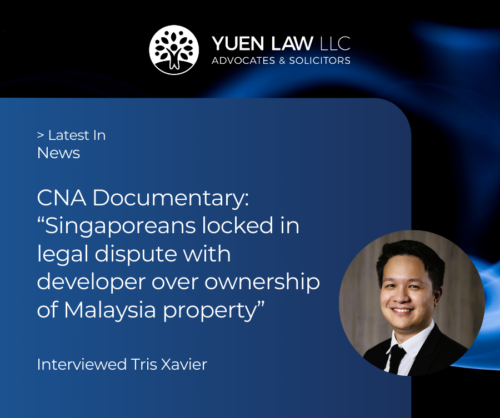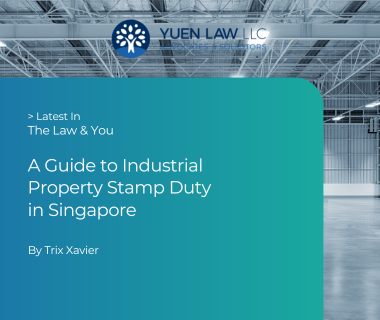
Overview of Property Co-ownership in Singapore
Property co-owners are often spouses, family members (such as parent and child, or siblings), friends, and business partners.
Most residential properties are owned as joint tenants by spouses. This includes 85% to 90% of HDBs and 70% to 80% of private properties. The remaining properties are typically held as tenants-in-common, and sole ownership accounts for a small percentage.
Joint tenancy is the most common Manner of Holding, primarily because it offers rights of survivorship and allows for shared financial responsibility.
In contrast, business partners co-owning commercial property typically prefer tenancy-in-common, allowing them to own the property in specific percentages based on their contributions or intended ownership.
Common Scenarios Where Disputes Arise Due to Refusal to Sell Property
- For HDB units, a common scenario occurs when one family member wishes to acquire their own HDB unit. Either an adult child who co-owns a HDB with their parents wishing to buy their own HDB unit (either alone or with a spouse), or an adult sibling who co-owns a HDB with another adult sibling, wishing to buy their own HDB unit (either alone or with a spouse).
- For private property, disputes often arise when one co-owner no longer wants to continue with the burden of financing the property.
- For commercial properties, business co-owners or co-investors may wish to go their separate ways, but cannot agree on how to deal with the property. This is because they do not have a prior written agreement about how to part ways and sell the property. Such agreements could include provisions like a strike price to trigger a sale. However, in the absence of such an agreement, resolving these disputes is more complicated.
- For spouses going through a divorce, one spouse may want to sell the HDB or private property to unlock funds and move on.
Type of Court Orders You Can Get to Force a Sale of Property
You can apply to Court for a court order to force the sale of a co-owned property. If you provide evidence of co-ownership and financial contributions, such as payments towards the property loan to prove your share of ownership, the Court can order the sale of your property, as well as determine how the net profits should be divided between the co-owners.
“The Court might consider the option of the other co-owner buying the share of the outgoing owner. If so, the Court would have to decide the price and the mechanism of the sale to the other co-owner.”
Factors that the Court Considers Before Ordering a Sale of Property
The Court takes several factors into account when deciding whether to order the sale of property, including :
-
- Type of co-ownership, such as whether the property is held as joint tenancy or tenants-in-common.
-
- The financial contributions of each co-owner towards the purchase price, housing loan, property taxes and also other expenses such as renovations.
-
- How income and rental derived from property was utilised.
-
- In the Family Justice Court, special rules apply under the Women’s Charter to decide the share that spouses should each have in a matrimonial home or property. The special factors include length of marriage, if there are children, direct financial contributions and indirect non-financial contributions such as caregiving by each spouse to the family.
How We Help Clients in Forced Property Sale Cases
Case Study 1:
Daughter vs Parents
We acted for the daughter who was the co-owner with both of her parents. The parents had sold their private property and given all the net profits to their two sons. Following which, they asked the daughter to buy a 4-room HDB unit with them. Other than a small down payment from the parents’ CPF, the daughter was told to pay for the monthly housing loan and $50,000 in renovation cost.
Due to shouldering the financial burden alone and facing a worsening medical condition, the daughter asked her parents to sell the co-owned property so that she could purchase a smaller HDB unit. However, her parents ignored her. In this case, the Court ordered a sale and determined each party’s share based on the available evidence.
Case Study 2:
Sibling vs Sibling
We acted for a patient living in a government nursing home, whose social worker sought government assistance on his behalf. As the patient co-owned a HDB unit with his elder brother, he did not qualify for government assistance.
The brothers had inherited the HDB unit from their parents. However, the elder brother started a family there, and the patient didn’t get along with them. He eventually moved out and ended up effectively homeless. The elder brother ignored the patient’s request for the sale and did not attend court once. The Court ultimately ordered a sale and divided the net proceeds equally.
Case Study 3:
Sister vs Brother
We acted for the sister who was a co-owner with her younger brother. Together, they agreed to invest in the private condo and rent it out, using the income generated to repay the monthly housing loan. Aside from a small contribution as down payment for the condo, the brother did not contribute to the monthly housing loan.
The sister found this arrangement unsustainable as she had to pay for the housing loan alone while the brother took the monthly rental for himself. Currently, the case is undergoing negotiations. The High Court has given the parties time to try resolving the matter amicably, and avoid a full trial to save legal costs.
Case Study 4:
Daughter-in-law vs Father-in law
A man was the sole owner of a HDB flat, and he died without a will. The HDB flat was inherited 50%-50% by his wife and father. The wife had obtained the Grant of Letters of Administration and transferred the HDB flat to her sole name as administrator of the estate.
Here, the elderly father-law requested the HDB flat be sold or that she buy over his 50% share. Since she was not a citizen, she could not be the sole owner of the flat, so selling it was the only alternative. As she wanted to live in the HDB flat, she refused to sell it. In this case, we acted for the father-in-law and obtained the Court for Sale, with the net profits to be divided equally.
Case Study 5:
Business partner vs Business partner
We acted for a local business partner who was a co-owner of a commercial property as tenants-in-common 50%-50%. The other business partner, a foreigner, refused to pay his share of the monthly loan repayment. When the tenant did not pay the rent and terminated the tenancy, the local business partner proposed for his foreign business partner to buy over his share. This was rejected by the foreign co-owner.
We are in the midst of applying to the High Court for the Court Order for Sale and reimbursement of housing loan repayments made on behalf of the other co-owner.
How Our Legal Team Can Help
In all our cases, our approach is to assess the status of ownership and study the available evidence of payments for housing loan and other liabilities for the property. This ensures that you understand the strengths of your case before you sue in court. This approach also helps us prepare your first written proposal to initiate negotiations.
“Our lawyers have found that the more detailed and the more documentary evidence you have, the more persuasive your proposal will be. Additionally, if the matter proceeds to court, a well-structured and thorough proposal makes it easier for the Judge to understand your case and give you the Order for Sale on the terms you seek.”
Frequently Asked Questions
The sale and purchase of HDB flat is subject to HDB regulations. Sellers must meet the Minimum Occupation Period (MOP) before they can sell their flat. Buyers, on the other hand, need to ensure that they meet HDB’s ownership eligibility requirements, including citizenship or permanent residency status, interest in other properties, and the type of resale flat being purchased.
While these restrictions do not apply to private property, homeowners of such properties should also consider whether seller’s stamp duty will be imposed, and if it a sale between co-owners, it must comply with the Residential Property Act.
The mortgage has to be settled in the process of the sale and should be taken into account in the wording of the Court Order for Sale.
Once an assessment is done by our legal team, the first step is not to sue in court. Rather, it is to write a legal letter proposing the sale of the property. This can save money and time if both co-owners can come to a mutual agreement. It is at this stage that we use the letter to persuade the other co-owner of the fairness of the proposal. This includes details of how we calculate the respective shares based on contributions by all co-owners.
This can be said to be the start of negotiations if the co-owner responds. In some cases, the co-owners realise the logic of the proposal and accept it with some changes made.
In cases where there is no response or the proposal is rejected by the other co-owner, your case can be brought to the High Court to issue a Court Order for Sale.
Even if the lawsuit has started, there is still opportunity to reach a mutual settlement through private mediation so that the lawsuit can be resolved without a court trial.

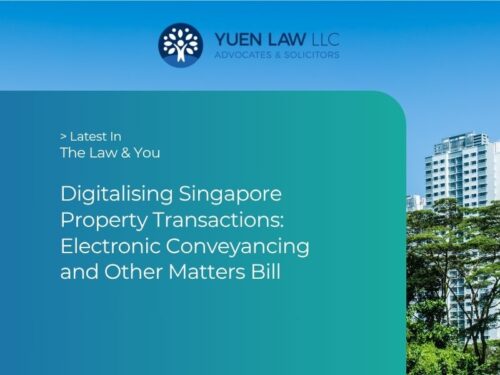
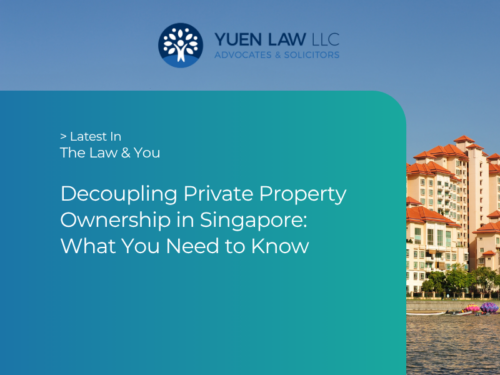
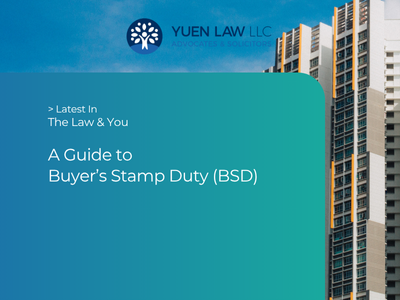
![Yuen Law Acts for Successful Applicant to Order Sale of Co-Owned Property, Sin Chiau Soon v Aitken Robert Bond [2025] SGHC 94 H2](https://yuenlaw.com.sg/wp-content/uploads/2025/06/Yuen-Law-News-Yuen-Law-Acts-for-Successful-Applicant-to-Order-Sale-of-Co-Owned-Property-1-500x375.png)
